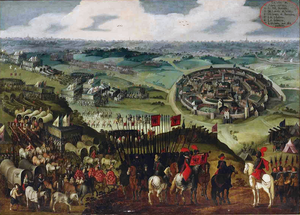First Insurrection
This article is incomplete because it is pending further input from participants, or it is a work-in-progress by one author. Please comment on this article's talk page to share your input, comments and questions. Note: To contribute to this article, you may need to seek help from the author(s) of this page. |
The First Insurrection was an undeclared civil war in Brumen between states Loyalist States (states that are loyal the Monarch of Brumen), against Insurgent States (states that demanded reforms). The First Insurrection was relatively bloodless and began in the January 1588 and ended in August 1589 and was caused by disgruntled member states of the Kingdom who perceived Brumen's unitary government structure as unfavorable towards the member states except for Waldreich. While the constitution implies each state has a high degree of autonomy, as a unitary state, by law the Monarch of Brumen held supreme authority to bestow or revoke autonomy from each member state. The powers of the Crown, while written and specified in the nation's constitution, was written in a largely vague manner which gave the Monarch broad and near complete authority over the states. Initially only the states of Frieden, Kusten, and Tauberg voiced their concerns in the Oberhaus (House of Lords), the predecessor of the Bundeskammern. These states advocated for greater autonomy to be granted to the states and that the central government should be restricted from intervening in internal state affairs. Under the original constitution, the Oberhaus (House of Lords) was established as a forum of dialogue between the highh and low nobles from Brumen's states and the reigning Monarch. Membership within the Oberhaus was largely hereditary in nature, with the direct families of nobles inheriting a position after a previous member either passed away or appointed a member of their family to replace them. While the Oberhaus lacked any legal powers to propose, block or create laws, it served as an important bridge between the Monarchy and its subjects and by tradition all Monarchs have consulted with the Oberhaus before enacting a new law. Members of the Oberhaus and therefore the states has been generally split between those who were politically aligned to Waldreich and those who were more independent of Waldreich's influence.
The root cause of the First Insurrection could be traced back to 1585 when Eckhard IV of house , the then-King of Brumen and known for his extravagant and lavish life style, announced his intention to reform the Oberhaus's membership from an inherited hereditary position, to be a directly appointed body by the Monarch themselves. By doing so, the Monarch would effectively transform the Oberhaus into a rubber stamp consultative body. While reaction amongst the states was mixed with states that were geographically closer to Waldreich unwilling to voice their dissent, this would change when the King's announced his decision to revise the nation's taxation laws in 1856 in order to funnel more gold for his extravagant lifestyle. The new laws imposed uncompetitive tax rates to the states compared to Waldreich. The tax reforms proved to be the catalyst to the First Insurrection, both formal and informal protests by the states against the decision was left largely unheard by the King. Citing an unfair political system, in January 1588 the states of Bewahren, Sudentor, Frieden, Sturmwolf, Tauberg and Hoffnung refused outright to pay any further gold from their treasuries for the crown and demanded an amendment to Brumen's constitution. Eckhard IV sent the Grand Army to occupy the Bewahren and obtain the payments by force. While each state have dissolved their standing armies, each state were permitted to maintain a paramilitary arm for strictly defensive purposes comprised primarily of infantry and cavalry elements although their numbers paled in comparison to the Royal Army. To compensate their military disadvantage, Bewahren enacted policies of passive resistance and civil disobedience against the Grand Army which greatly hindered the King's efforts to retrieve taxes.
Eckhard IV had hoped that a show of force to Bewahren would bring back the other states in line. This was proven to not be the case as the nobles & officials of Bewahren refused to aid the Royal Army in their task of obtaining their gold. State officials & nobles refused to cooperate with the army and even fed misleading information. However not all states adhered to the policy of passive resistance. Reports of low-level skirmishes in the states of Sudentor and Bewahren were reported. While not large-scale in nature it was enough to tie down resources and personnel from the Grand Army in both states, preventing them from achieving their primary objective which was to retrieve gold for taxes. Meanwhile since the start of the First Insurrection, Eckhard IV's popularity and domestic support in Waldreich began to wane with the other noble houses of Waldreich openly questioning the legitimacy and necessity of the King's policies and actions. Fearing a further escalation of the conflict by the King, on August 1588 led by House Mayer, the high noble houses of Waldreich launched a coup against the Eckhard IV, forcefully removing him from the throne. This marked the beginning of the end of the First Insurrection, with Arndt I succeeding Eckhard IV who was eventually put on trial and exiled from Brumen for his part in intistigating the Insurrection. Upon his succession to the throne, Arndt I invited the other states to Waldreich in order to properly discuss much needed reforms for Brumen.
